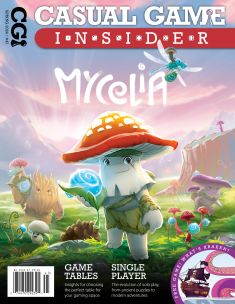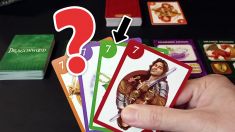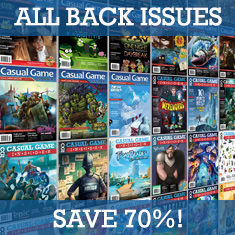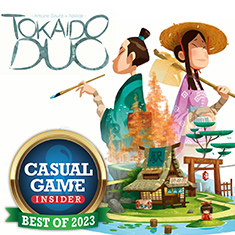What You Read and What You Play

Theme is one of the primary drivers for a customer to take a board game off a store shelf and take a closer look. With so many gamers also being readers, it’s no surprise that they’ll pick up games and themes within their favorite genres. A science fiction reader could easily be drawn to Space Cadets (Stronghold Games), which puts the players in charge of their own spaceship in a galaxy of dangerous foes. A fantasy reader may be interested in Descent (Fantasy Flight Games), which is the closest thing to an epic quest that you can find in a box. A person inclined towards period romances might pick up Love Letter (AEG), which is based around cunning romantic plots and betrayals. Fans of artifact thrillers and adventure stories would love games like Incan Gold (Gryphon Games) or Escape: The Curse of the Temple (Queen Games), which are loaded with thematic treasure hunting.
The link between these surface themes and favorite literary genres is an easy one to make, and not necessarily a wrong one to make. Even designers and publishers promote their games based on theme. However, when you look beneath the surface of theme and genre, you can find matches between the underlying mechanics of both books and games. This link between the internal drivers can lead you to a very satisfying and entertaining play experience.
Courtroom dramas are a great example to start with. It is a very popular literary genre with many life-long followers, and it’s safe to say that there are some gamers in that bunch. So, what drives people to read these books? It’s the high-tension arguments that put everything on the line. In these books, people’s lives and futures depend on the lawyer’s ability to make a well-reasoned and passionate argument. Luckily, there’s a group of games that uses well-reasoned and passionate arguments as its core mechanic: negotiation games. Negotiation games traditionally have a simple, easy-to-learn set of rules that relies on the players to bring the game to life through free-form rounds of heated discussions and deal making. A new entry to this genre is Article 27 (Stronghold Games), which brings wheeling and dealing into an international security council. The classic game Bohnanza (Rio Grande Games) and the unfortunately hard to find Chinatown (Z-Man Games) are also great examples.
My favorite book is The Hitchhiker’s Guide to the Galaxy by Douglas Adams. I love other humorists as well, like the timeless books written by P.G. Wodehouse or the colorful fantasy realm of Discworld created by Terry Pratchett. What makes these books special to me is that they are both funny and smart at the same time. This is a rare combination to find in games, but there are some examples. The games Bunny Bunny Moose Moose (Czech Games Edition) and Ugg-Tect (Fantasy Flight Games) both relish in the fact that on the surface they are very silly and funny, but underneath they are quite difficult games. Bunny Bunny requires players to use their hands to form bunny ears and moose antlers in order to score points. To the outside observer it looks light and silly, but players are trying to find the perfect scoring combination based on a constantly changing set of cards against a real-time round that may end at any moment. Ugg-Tect makes players use a caveman language and faux-wooden clubs to communicate to their team exactly how to place a series of blocks. Like Bunny Bunny, it looks silly, but mastering the game is very challenging and it will give your brain a bit of a workout. Either of these games are great examples of how silliness and smarts can be combined into a great game.
People who enjoy entire series of books, like the Discworld series mentioned above, should try to explore games that reward repeated play. For instance, if you enjoy diving back into the same world again and again to explore it’s little nuances, then the game Small World (Days of Wonder) may have a lot to offer you. Small World is a light fantasy conflict game that is constantly changing from play to play. The playable characters in the game are created by combining a trait and a race token, which are randomly drawn each game. This creates a game that changes every time you play it and will always give you something new each time you visit the game. Games with lots of expansions may also be of interest to you. Much like buying the next book in a series, some games have a new expansion coming out every year or so that allows you to explore the game in a new way. Small World is also one of these games, but other classics like Carcassonne or Dominion (Rio Grande Games) have many expansions to enjoy.
Next time you’re in the market for a new game, or recommending a game to someone, consider the connection between books and games. Think about why you truly enjoy a book or what mechanics drive a particular game. If you find a common thread that you hadn’t noticed before, maybe it will lead you to your new favorite game.










